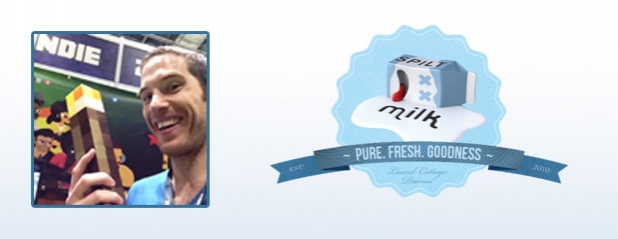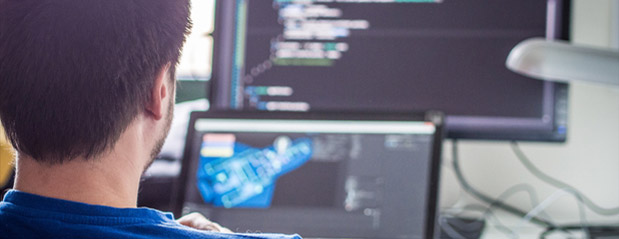Life as a Game Dev: Interview with Andrew J Smith from Spilt Milk Studios

With the mobile games industry taking off, we chat with games developer Andrew J Smith from Spilt Milk Studios about apps, games, coding, twitter culture and what the future has in store for games developer jobs.
Hi Andrew, thanks for taking some time out to chat with us. First of all, how did you get into developing apps?
I started off making games in the ‘mainstream’ console industry, but when I decided to set up a company by myself some 3 years ago, I thought that the scope of most apps and games in mobile, plus the ease of access to development equipment and the digital storefront meant I’d be able to turn out lots of high quality games in a relatively short timescale.
As an 'appreneur', how much do you actually do yourself and what do you get the other guys in your team to do for you?
I am the project manager, producer, designer, and often do a little bit of art and audio work too. The key area I use other team members for is coding – this is the one skill I’ve never been able to successfully dabble in. That said I also much prefer to use professional artists and musicians for the art and audio sides of projects, as you get much better results.
How do you bring the whole project together?
I tend to document in some detail the initial prototype. With games development, you are best served getting the game playable as swiftly as possible, so I try to do everything I can to make that happen. I work the most closely, and the most regularly, with the coders on a project, trying to make their job as simple as possible. I hope I’m successful, but often it’s really hard to foresee all possible hiccups and roadbumps.
What are you working on at the moment? How do you expect it to be received?
I’m working on two games. One is a twin-stick shooter designed for touch-screen (so without any sticks!) called Lazarus. It’s a fast, furious and frantic top-down shooter where you must battle endless waves of evil enemies intent on destroying you. It’s all about getting a high score because you will eventually die, however good you are! This is soft-launching soon, and the other project is Smash The Block, a game inspired by Breakout, releasing on mobiles soon too. It’s cute, fun, full of character and really very addictive.
You’re extremely active on Twitter, how does that help you as a Games Developer?
I see twitter as a conversational medium. People join in when they find something interesting, and as such I try to maintain a presence there at all times. I even go so far as to show very early artwork, screenshots of builds you’d normally think twice about posting on a website, and what I made for dinner! This personal and ‘behind the curtains’ approach tends to pay off as you build excitement not just for individual projects, but for your company too. Anyone not using twitter these days is missing out on a hugely engaged and responsive fan base – one that will pay dividends in terms of sales as well as helping you improve your products… if you let them!
Any other projects in the pipeline?
Once Lazarus and Smash the Block are both soft-launched, we’ll gather data, tweak, and then launch them worldwide. After that, I’m hoping to start a 3rd project while supporting the fans and community that exist around those two games. New content, bug fixes, updates, new features… all of the kind of things people love!
Now that some more high street giants have fallen over this year (HMV and Blockbuster) having lost out to online competitors, what are your thoughts on the gradual migration of society to the digital spaces?
It’s inevitable that, for the most part, people will get their digital content online. The thing that high street has to offer is a real-world social space in which fans, enthusiast and hobbyists can go to share their passion with likeminded individuals and creators. I don’t see many people taking advantage of this, but I swear to god the first coffee shop/bar to restructure itself around an arcade and a retail shop for games will make a killing. It’s the future. In a broader sense, society will become more and more used to digital and online being part of everyday life, even down to schoolrooms. But the beauty of it is that over time, as a new generation grows up knowing no different, we’ll see it feedback. There’s still a sense of fear about the move to digital. It’s not a move. It’s an integration. The real world won’t go away, and the sun will still shine.
What advice would you have for anyone wanting to become a mobile games developer?
Be smart about the audience you’re selling to. A lot of developers jump into mobile seeing huge audience numbers and assuming they’ll find a big niche for their games just by releasing them. This is a bit of a fallacy, at least currently. Marketing, PR and really using every tool that social media gives you to try and get attention for your game will mitigate that sort of thing, but you can’t ignore reality. Freemium games are taking over on mobile, and as more and more people come to expect their games to be free, the less and less we’ll be able to get away with charging for them upfront… at least on mobile. This in turn affects how you must design games for the platform/audience on a very deep an intricate level. It’s not to be underestimated.
Spilt Milk Studios got off to a roaring start with some great games, but what are your long term plans for the company and your career as an appreneur?
This year is the year that I finally staff up with some permanent contributors, and as such will be a much more prolific one. The last two years have been dominated by supporting previous releases, some great client work for companies like AppyNation (who are fantastic by the way) and of course developing our current two projects. This year we’ll see at least two games launched and with any luck one or two more. It’s incredibly exciting! Looking even further ahead I want to build my studio around great IP, brilliant games, and stay open to whatever the future might hold.
Last question: What’s your favourite game?
It depends on my mood actually. Super Mario World on the SNES was a brilliant game. Just peerless joy, fiendish level design and it puts a smile on your face from start to finish.


